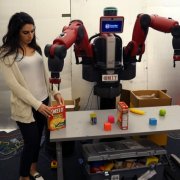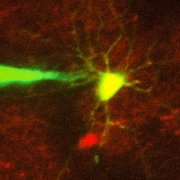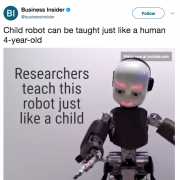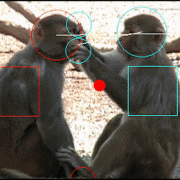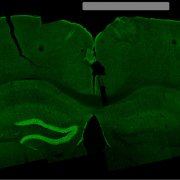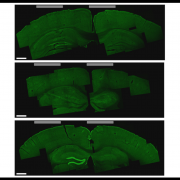September 21, 2017 - 9:45 am
"Infants who saw a researcher keep at a difficult task tried harder themselves
By Yasemin Saplakoglu
Opening a jar of pickles should not be that difficult. And while you are busy mumbling, grimacing, hopping on one foot and holding the jar against your hip until the lid pops open, a young brain may be analyzing the spectacle and learning from it.
Researchers at Massachusetts Institute of Technology have found infants who watched an adult...
September 20, 2017 - 9:30 am
"A startup called iSee thinks a new approach to AI will make self-driving cars better at dealing with unexpected situations.
by Will Knight
Boston’s notoriously unfriendly drivers and chaotic roads may be the perfect testing ground for a fundamentally different kind of self-driving car.
An MIT spin-off called iSee is developing and testing the autonomous driving system using a novel approach to artificial intelligence. Instead of relying on...
September 15, 2017 - 2:00 pm
Dr. David Ferrucci
Abstract: AI systems should not only propose solutions or answers but also explain why they make sense. Statistical machine learning is a powerful tool for discovering patterns in data, but, Dr. Ferrucci asks, can it produce understanding or enable humans to justify and take reasoned responsibility...
August 30, 2017 - 12:30 pm
ComText, from the Computer Science and Artificial Intelligence Laboratory, allows robots to understand contextual commands.
Adam Conner-Simons | Rachel Gordon | CSAIL
Despite what you might see in movies, today’s robots are still very limited in what they can do. They can be great for many repetitive tasks, but their inability to understand the nuances of human language makes them mostly useless for more complicated requests.
For example, if you...
August 30, 2017 - 12:15 pm
Success rate is comparable to that of highly trained scientists performing the process manually.
Anne Trafton | MIT News Office
Recording electrical signals from inside a neuron in the living brain can reveal a great deal of information about that neuron’s function and how it coordinates with other cells in the brain. However, performing this kind of recording is extremely difficult, so only a handful of neuroscience labs around the world do it...
August 22, 2017 - 1:15 pm
Tweeted from our colleagues at IIT - "The story of our @iCub on @techinsider!"
Watch the video at the link below.
Here at CBMM, we are happy to count IIT as one of our partners. Their iCub robot is a great tool for exploring developmental robotics. While it is still very far from being able to learn like a human child, it is a tool to push AI in the right direction. The iCub is a useful platform to test models of children's learning and to...
July 31, 2017 - 10:15 am
by Theodore (Ted) Stark
When you see another person, your brain utilizes the fusiform facial area (FFA) to identify the face faster than anything else. Therefore, you can recognize faces before you can recall a person’s name. When viewing a face from the side (say 45 degrees), specific neurons fire within the FFA to recognize a face even at an angle. Researchers from MIT’s Center for Brains, Minds, and Machines (CBMM) have reported a...
July 8, 2017 - 4:00 pm
"To effectively communicate with one another, we have to understand that everyone has their own unique feelings, thoughts, desires and beliefs. Without our ability to intuit the emotions and mental states of others, there would be little room for cooperation or empathy or the many other qualities that make us human.
Scientists use the term theory of mind to describe our capacity to accurately understand one another during social interaction. We...
June 23, 2017 - 2:00 pm
Andrei Barbu
Title: On the road to understanding human and machine performance in object recognition
Abstract: According to current benchmarks machine performance on common object detection tasks approaches or even surpasses that of humans. Yet everyone's experience running object detectors indicates this is...
Abstract: According to current benchmarks machine performance on common object detection tasks approaches or even surpasses that of humans. Yet everyone's experience running object detectors indicates this is...
June 19, 2017 - 3:30 pm
"La capacità di gestire i rapporti sociali coinvolge una gerarchia di reti cerebrali che classificano in modi diversi gli elementi di una situazione. Una di queste reti si attiva esclusivamente quando è presente e attivo un possibile partner di una relazione sociale(red)
VAI AL VIDEO: Lo sguardo sull'interazione sociale
Nel cervello dei primati esiste un circuito neurale dedicato esclusivamente all'analisi delle interazioni sociali. A...
June 6, 2017 - 4:00 pm
"Understanding social interactions and what others are thinking is essential for relationships. Monkeys, like humans, can recognize and interpret social interactions. Primates use behaviors like playing, grooming, and fighting to determine social rank and gain allies in their group. But how the brain processes social interactions is unknown.
Drs. Julia Sliwa and Winrich A. Freiwald at Rockefeller University investigated the neural circuitry...
June 1, 2017 - 7:00 pm
by PAM BELLUCK
The New York Times
"Pulses of electricity delivered to the brain can help patients with Parkinson’s disease, depression, obsessive-compulsive disorder and possibly other conditions. But the available methods all have shortcomings: They either involve the risks of surgery, from implanting electrodes deep within the brain, or they stimulate from the skull’s surface, limiting the ability to target electricity to the right brain...
June 1, 2017 - 1:15 pm
Anne Trafton | MIT News Office
Excerpt: "Delivering an electrical current to a part of the brain involved in movement control has proven successful in treating many Parkinson’s disease patients. This approach, known as deep brain stimulation, requires implanting electrodes in the brain — a complex procedure that carries some risk to the patient.
Now, MIT researchers, collaborating with investigators at Beth Israel Deaconess Medical Center (...
May 30, 2017 - 4:00 pm
Noam Chomsky (MIT)
Title: Language and Evolution
In their latest book, Why Only Us: Language and Evolution, Berwick and Chomsky discuss the biolinguistic perspective on language, which views language as a particular object of the biological world; the computational efficiency of language as a system of thought and...
In their latest book, Why Only Us: Language and Evolution, Berwick and Chomsky discuss the biolinguistic perspective on language, which views language as a particular object of the biological world; the computational efficiency of language as a system of thought and...
May 29, 2017 - 4:00 pm
"Monkeys show evidence of having developed the parts of the brain dedicated to analyzing social interactions. The new information - aside from offering a peek at monkey's brain activity - can also help scientists understand the origins of human's social cognition.
According to a report from Rockefeller University, Winrich Freiwald and Julia Sliwa found areas in the brains of rhesus macaque monkeys that analyze social interactions. The team of...




